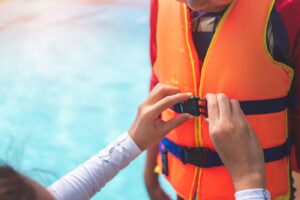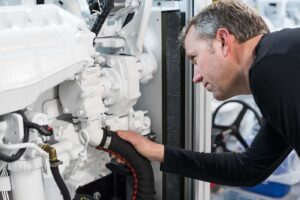Safety is paramount while boating. Whether you’re sailing for work or leisure, it’s important to be prepared and knowledgeable about the potential risks of being out on the water. From understanding your vessel’s radioed messages to wearing protective clothing, there are a variety of ways you can protect yourself.
Here, we’ll discuss some key safety tips as well as what should be kept in mind when planning and enjoying a day out on the seas. With these simple but vital pieces of advice, you can feel confident that your experience will be both safe and enjoyable!
Invest in the proper safety equipment – life jackets, flares, whistle, and a first aid kit
Investing in the proper safety equipment is a crucial step in ensuring that you and your loved ones stay safe while out on the water. Life jackets are a must, and should be worn at all times while the boat is moving. Flares, a whistle, and a well-stocked first aid kit are also essential items to have on hand.
No one plans for accidents to happen, but being prepared with the right equipment can make all the difference in an emergency. Don’t take any chances when it comes to safety out on the water – make sure you invest in the proper gear and know how to use it.
Learn to read the weather conditions and plan accordingly
Being able to read weather conditions and plan accordingly is an essential skill for anyone who wants to stay safe and on track. Understanding the temperature, wind speed, and precipitation can help you prepare for any scenario, whether you’re going for a hike or planning a long road trip.
With the help of modern technology like weather apps and radar maps, it’s easier than ever to stay informed and adjust your plans accordingly. By taking the time to learn about different weather patterns and their potential impact, you’ll be better equipped to make smart decisions and stay safe in any situation.
Check your boat for proper boating lights and functioning emergency flotation devices
Before embarking on a boating adventure, it is essential to ensure that your vessel is equipped with appropriate boating lights and functional emergency flotation devices. The use of proper lighting is not only a legal requirement but also crucial for the safety of yourself and other boaters. It ensures that other boats can see you and also allows you to navigate safely through the water, especially during low visibility conditions.
Additionally, emergency flotation devices are essential in case of an unforeseen incident that could cause your boat to capsize. Having functional and easily accessible life jackets can save lives and provide peace of mind while enjoying your time on the water. So, before setting sail, make sure to check your boat for correct lighting and proper flotation devices.
Familiarize yourself with common water hazards like rocks, reefs, and sandbars

Water hazards can be dangerous to boaters if not properly identified and avoided. Rocks, reefs, and sandbars are some of the most common water hazards that boaters encounter. Knowing how to identify and avoid them can significantly improve your boating safety.
Rocks can cause serious damage to boat hulls, while reefs can be difficult to spot and cause serious accidents. Sandbars, on the other hand, are shallow areas that can easily ground a boat. Familiarizing yourself with these hazards can help ensure a safe and enjoyable boating experience, so take the time to learn and practice proper navigation techniques.
Take an accredited boating safety course for proper instruction on how to operate a boat
If you’re planning on taking your boat out on the water, it’s important to have the proper knowledge and training on how to operate it safely. One way to do that is to take an accredited boating safety course. These courses provide detailed instruction on the proper operation of a boat, including navigation, communication, and safety procedures.
They also cover the laws and regulations that boaters must follow on the water. By taking a boating safety course, you’ll increase your own safety and that of your passengers, while also ensuring that you’re following the rules of the waterways.
Follow all navigational buoys and markers when cruising around bodies of water
When it comes to cruising around bodies of water, it’s crucial to adhere to all navigational buoys and markers. These signs provide vital information about the waterway, including the depth of the water, potential underwater hazards, and any regulations or speed limits in place. Ignoring or neglecting these markers can have severe consequences, not just for your own safety but for the safety of others and the environment.
Additionally, following navigational buoys and markers demonstrates responsible boating practices, which is paramount for preserving our waterways for generations to come. So, before embarking on your next boating adventure, make sure to educate yourself on the navigational signs in the area and always follow them.
Boating can be an amazing, peaceful experience; however, for it to be enjoyable and safe, it’s important that boat owners do their part to become educated and take the necessary precautions. Investing in the proper safety equipment and educating oneself on boating laws, weather conditions, and navigational hazards is essential for maintaining safe waters.
Following all the recommended steps – such as wearing life jackets, utilizing emergency flotation devices, learning to read the weather forecast and plan accordingly, and familiarizing oneself with water hazards like rocks and sandbars – will lead to a successful boating experience. Finally, consider taking an accredited boating safety course for a more in depth knowledge of running a boat properly. By preparing in this way before hitting open waters, no matter how large or small the vessel may be, boat owners can feel confident in their abilities when steering their craft.
Practicing good safety habits with Mack Boring
At Mack Boring, we aim to provide top-of-the-line parts for your vessel — all of which promote excellent safety standards. From diesel outboards to stabilizers, we have it all. To learn more about our offerings, please visit our website and check out our products today!





